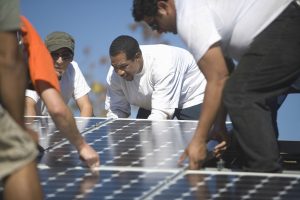Front Porch Blog

Photo by BigStock
At first glance, two recent news stories appear unrelated, but a closer look reveals they point in the same direction — the convergence of the tremendous economic opportunities of building a strong clean-energy sector in the U.S., and the needs of low-income, largely disenfranchised populations.
On February 20, when temperatures across the East and South sank well below freezing, customers served by two of the nation’s largest electric utilities — Duke Energy Carolinas and Dominion Virginia Power — set all-time highs for energy use. So did customers of a much smaller utility, Blue Ridge Electric Membership Corp. in western North Carolina. Other utilities may have set records as well.
It also happened to be the same day that the NAACP passed a resolution entitled, “Promoting Equitable Access to Clean Energy Alternatives” calling for programs and policies that ensure affordable access to clean energy options for all, and job training and opportunities for lower-income African-Americans.
Connect the dots: increasing energy efficiency and other clean energy choices like rooftop solar can reduce overall demand on the grid, save money for families and companies, and create economic opportunity for communities that need it most.
High consumption = high cost
The utilities, in announcing the record-high energy use, neglected to note that their customers just might be getting record-high electric bills next month to pay for all those kilowatt hours. High bills can be especially burdensome on low-income families, which sometimes spend as much as 20 or 30 percent of household income on electricity.
Rather than building ever more fossil fuel generators to cover spikes in energy use (which arguably we’ll be seeing more of in winter and summer as climate change continues to wreak havoc on weather patterns), utilities ought to be investing a lot more in helping their customers weatherize and insulate their houses and apartments. Those who would benefit most are lower-income families, rural and urban, who can least afford the upfront costs to make energy-efficiency improvements, yet whose homes are in worse shape than most.
Moreover, studies show that implementing energy efficiency and other clean sources of energy, like solar and wind, creates jobs and business opportunities, and strengthens local economies.
Cleaner energy = more equitable energy
The flip side here, as the NAACP’s resolution notes, is that the cost of not transitioning to clean energy is disproportionately borne by communities of color and low-income communities in terms of the health impacts of mining, burning fossil fuels, dumping the toxic waste, and the impacts of climate change.
“The NAACP has a vested interest in improving the quality of lives of those most adversely impacted by high rates of energy consumption, while promoting safer, affordable, and equitable energy alternatives and supplier options. Our adopted policy is reflective of our historical civil rights legacy,” says Kathy Egland, chair of the NAACP National Board of Directors Environmental and Climate Justice Subcommittee.
Hitting record-high energy use is nothing to crow about. Although Duke and Dominion said that emergency conservation measures by their customers helped them get through the February 20 spike, they aren’t fully connecting the dots: deploying robust energy efficiency and clean energy programs will provide a more secure, affordable, and equitable energy system for its customers long into the future.
PREVIOUS
NEXT
Related News

Leave a comment
Your email address will not be published. Required fields are marked *

Good one Cat. Clean energy is indeed the future. In the times of Global warming and climatic issues, one must turn towards sustainable sources of energy. It is all about taking advantage of the resources available to us and using it to our benefits. It is sometimes as simple as resolving a plumbing issue.
Wind and solar power will continue to be economic and environmental boons for all people. Clean energy is the future. Everyone will be able to take part soon enough.